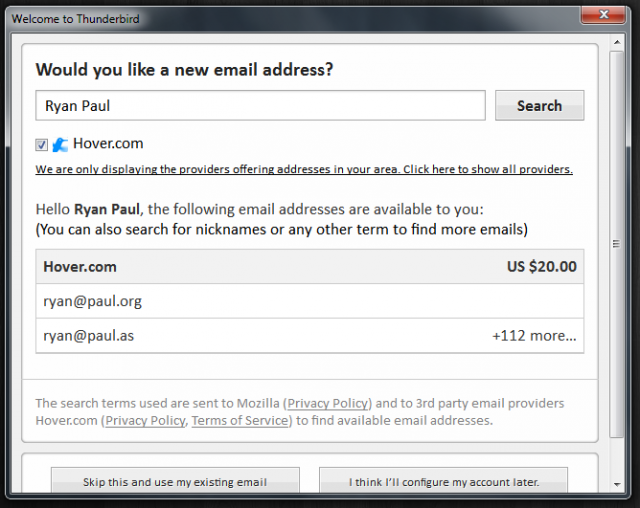
Mozilla officially released Thunderbird 13 yesterday, a new version of the open source e-mail client. The update brings several new features, including support for personalized e-mail addresses and easier sharing of large files.
Since the release of Thunderbird 5 last year, Mozilla’s e-mail client has been on the same rapid, time-based release cycle as the Firefox Web browser. Aligning with Firefox’s schedule made it possible for Thunderbird to continue benefiting from improvements to the underlying Gecko rendering engine, which is shared between the applications.
The biggest change in Thunderbird 13 is a new feature that allows the user to register a new domain name during the setup process in order to obtain a personalized e-mail address. The feature is made available when the user is configuring an account in Thunderbird.
When selected, Thunderbird will prompt the user for their name or nickname and will then perform a domain search to find a suitable match. It will display available addresses, spanning unregistered domains that are available and addresses on generic domains that are already owned by the providers.
The service is backed by Hover and Gandi, which handle the domain registration and e-mail hosting. The Hover service, which offered by default to US users, costs $20 a year. When the user goes through with the setup process, Thunderbird will automatically configure itself to support the user’s new e-mail address on the custom domain name.
In addition to the personalized e-mail address feature, Thunderbird has also added improved support for sending large attachments. Mozilla has partnered with YouSendIt, a commercial file sharing service that works a bit like a file locker. Users can optionally configure a YouSendIt account in the Thunderbird preferences and use that service for attachments that are larger than a specified size. Mozilla says that support for additional file sharing mechanisms will be added in future versions.
The new features in Thunderbird 13 give commercial third-party services prominent positioning in the open source mail client. This seems like a pretty obvious attempt to monetize the application—much like Mozilla’s lucrative search engine partnerships for Firefox. That’s not necessarily a bad thing, especially if it helps furnish the financial resources that are needed to continue improving the mail client.
Over the past few years, Thunderbird development has progressed too slowly, preventing the application from living up to its full potential. Mozilla simply hasn’t continued to build on the great ideas and architectural improvements that are introduced in Thunderbird 3 back in 2009.
Impressive projects like the Gmail-inspired conversation layout are stuck in beta and seem to have stalled. More recent projects like the effort to add a built-in instant messaging client have been slow to land. An infusion of cash could help to remedy these issues and put Thunderbird back on the right path. Thunderbird 13 is available for download from the Mozilla website.
Listing image by Beau Lebens
reader comments
34